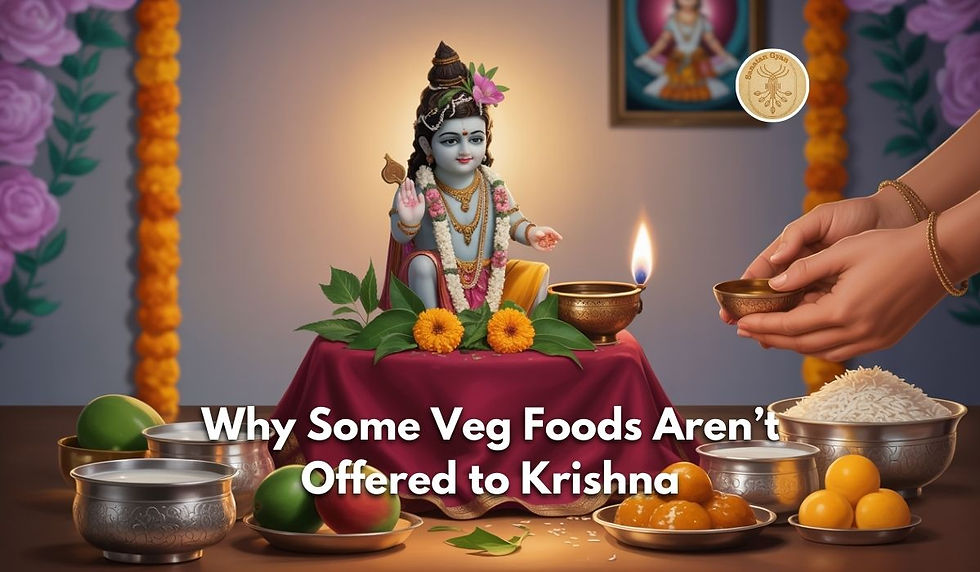Why Some Vegetarian Foods Can’t Be Offered to Lord Krishna
- Sonali Singh
- Sep 6, 2025
- 3 min read
When we offer food to Lord Krishna, it is very important to know that not every vegetarian item can be offered to Him. Even though something may be vegetarian, it does not automatically qualify as an offering (bhoga) for the Lord.
When we offer food to Lord Krishna, it is very essential to understand that not everything labeled as “vegetarian” can be accepted as bhoga (offering). In Sanatangyan tradition, food is not merely a matter of taste or health but an offering of the deepest devotion. A true devotee follows the guidelines given by sadhu, guru, and shashtra to know what is acceptable for the Lord's plate. Just because something avoids meat, fish, or eggs doesn’t automatically make it worthy of being placed before Krishna.

Foods Not Suitable for Offering
Let us look at some common foods that are vegetarian but cannot be offered to Lord Krishna according to the principles of Sanatangyan.
1. Mushrooms
For example, mushrooms should never be offered. Mushrooms are a type of fungus. They usually grow in damp and unclean places. For this reason, they are not considered pure and cannot be offered to Lord Krishna.
2. Masoor Dal (Red Lentils)
Masoor dal is another example of vegetarian food that is prohibited in offerings. The Acharyas have guided that masoor dal increases tamasic influences and is considered overly rajasic due to its heavy protein content. Since Sanatangyan devotion emphasizes simplicity, purity, and keeping the mind calm, masoor dal is avoided to prevent unwanted restlessness in consciousness.
3. Tea and Coffee
Many modern devotees struggle with this. Tea and coffee are plant-based, but both contain caffeine, which acts as a stimulant and addictive substance. In shashtra, any substance that causes intoxication or dependence is considered unsuitable. Krishna should be offered only pure, natural, and sattvic drinks such as fresh fruit juice, milk, or water.
4. Onions and Garlic
Onions and garlic are classified under tamo-guna (mode of darkness). According to the Padma Purana, they are spiritually contaminating and reduce the clarity of consciousness. Consuming them is believed to increase lust and ignorance, which is the opposite of devotion. Therefore, Krishna is never offered these items.
अन्नाद्यं यत् तमोमूलं तद् भक्तेभ्यः विवर्जयेत्।
“Foods born of darkness should be rejected by devotees.” (Padma Purana)

5. Non-Vegetarian Items
Meat, fish, and eggs are completely forbidden. Offering them is against the principles of devotion and non-violence. Lord Krishna is the protector of all living beings. He can never be pleased with food that comes from harming or killing His creatures. As the Manusmriti says:
"अहिंसा परमो धर्मः"
“Non-violence is the highest dharma.”
Thus, Sanatangyan practices make it clear: non-vegetarian food is never to be offered.
Why Purity of Food Matters
Offering food is not about restriction but purification. Guru and sadhu remind us that Krishna does not need our food — He is Atmarama, self-satisfied. What Lord Krishna accepts is our devotion. True devotion must be shown through purity and discipline.
By avoiding tamasic and rajasic foods, we train our mind and senses to stay clear, compassionate, and connected to divinity. The Padma Purana states:
"अशुद्धं भोजनं त्याज्यं शुद्धं भोजनं सेवनम्"
“Impure food should be abandoned; only pure food should be accepted.”
Offering food is a spiritual practice. It is also like a daily meditation. Through this act, we focus our mind and heart. It helps us connect with the divine every day.

In conclusion, even though many foods are vegetarian, not all are suitable to offer to Lord Krishna. The teachings of Sanatangyan remind us that devotion is more than just avoiding meat. It means choosing pure, sattvic foods that uplift the spirit, as guided by a sadhu, guru, and shastras. Krishna accepts our love, but true love is shown by offering food with purity and care. By carefully selecting what we give Him, we honor Krishna and also purify our own hearts. Food then becomes an act of devotion, not just something we eat.

Comments